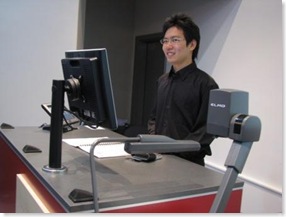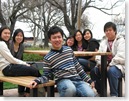The notion of standing in front of a group of people delivering a speech is an exercise of self consciousness, a training of how you would react with numerous pairs of eyes watching you intently, expecting you to deliver. Indeed, when giving a speech, you are the centre of attention, and you can either be the eye of the storm or the epicentre of the earthquake.
Public speaking had often being the number one fear of most people. It is something we only do when we are forced to do. But like most phobias and fears, it is something that one can grow out of.
Public speaking was also once one of my greatest fears. I suspect it all stemmed from an incidence in Primary 3 where I managed not to utter a single word while on stage in a singing competition. From that day onwards till I was in Form 4, I never spoke on stage.
When I finally did it, it was with the maxim that the best way to do a presentation is to memorise every single word: each noun, verb, adjective and pronoun to the last full stop. I still remember the time in INTEC when I rehearsed a presentation more then 30 times before doing the actual thing.
One thing good about pharmacy I can say, it that they really trained you to speak in public. After delivering a fair share of presentations, I began to relax a little and found that the trick to do that is to treat the presentation as a fun thing to do. Now, public speaking is just more of knowing the main points and words will flow.
The aim of a speech is to get the message through and an added bonus is for people to remember the message afterwards. I felt that no matter how good you are, if you can't give an interesting speech, the majority wouldn't want to hear what you say. Hence I always sought to be creative and make my presentation stand out.
In a class announcement, I tried to incorporate fun into my 2-3 minute spiel. One time I started with a slide with only some random numbers and alphabets on it, which actually stands for the first letter of every word I am going to say. I think it was an effective attention grabber and also let the audience have a little bit of fun.
One of the thing I dreaded most about presentations is the Q&A session. But I realised that in a presentation, you are the one who control everything, not the listeners. In a recent presentation, I turned the table and asked the listeners a question before they can ask me. It is a twist that surprised people.
Another technique I found very useful is anchoring. It is a NLP technique where you visualise past moments when you are at the height of your confidence and transform them into physical manifestation which you can tap into anytime you need a dose of confidence.
Nevertheless, I felt that the best way to ace it is by taking that tried and trusted path - speak about your own experience. This is because it is the thing you know best. Inject some personal anecdote into your speech and it will be hard to go wrong from there.
I never profess to be a great speaker, and don't think I am one, even though I wish to be one. I still feel nervous, my hands do tremor and shake all the time, but I am actually very excited and loved the adrenaline rush when I have a chance to speak. The aim of this post is just to spill my two cents' worth about something I really care about - an essential life skill that shouldn't be as frightening as it seems. Public speaking is actually not that frightful at all, and some jitters is perfectly alright. The simple concept is that by not viewing it as a huge hurdle, it will cease to be one.














2 comments:
Interesting... For myself the key is to build up your confidence gradually, and to know your stuff.
*my confidence*, *my stuff*
Post a Comment